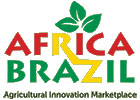15-18 September 2015. Brasília. FORUM 2015: Agricultural Innovation Marketplace. The Agricultural Innovation MKTPlace is an international initiative supported by different partners aiming to link Brazilian, African and Latin American and Caribbean (LAC) experts and institutions to develop cooperative research projects for development.
The Innovation MKTPlace is composed of three basic pillars:
 Participants went on a field trip to Jerivá, a family run farm and food processing operation. Jerivá is recognized for its effort to organically produce agricultural products and to recycle by products and left overs. Participants had the opportunity to see organic vegetable production, composting method used on the farm, and animal production. Swine, laying hens and egg collection techniques and disease control were discussed with technicians and property owners. Dairy production is the most important activity on
Participants went on a field trip to Jerivá, a family run farm and food processing operation. Jerivá is recognized for its effort to organically produce agricultural products and to recycle by products and left overs. Participants had the opportunity to see organic vegetable production, composting method used on the farm, and animal production. Swine, laying hens and egg collection techniques and disease control were discussed with technicians and property owners. Dairy production is the most important activity on
 the farm from the financial perspective.
the farm from the financial perspective.
At Jerivá agroindustry, they were able to discuss cheese production and the careful preparation of typical Brazilian sweets (pamonha, doce de leite, curau).
The Innovation MKTPlace is composed of three basic pillars:
- A policy dialogue between the main authorities from Africa, LAC and Brazil supporting institutions focused on the development of a mutually agreed framework for collaboration;
- A forum for capacity strengthening,presentation and discussion of research for development ideas consolidated into research for development projects supported by the MKTPlace;
- Joint agricultural research for development projects.
There were over 100 participants at the Forum 2015, which was preceded by two internal workshops about governance and project implementation:
- From MKTPlace to M-BoSs: The Steering Committee (SC) members discussed the achievements and the next steps of the MKTPlace, including the new Marketplace – Building on the Successes (M-BoSs) a scale up initiative for the most successful MKTPlace projects.
- Project Implementation This workshop discussed experiences and expectations aiming at identifying difficulties, strengths and key ideas to overcome the challenges and develop project-tailored roadmaps to success. The senior co-leaders shared experiences and the junior co-leaders were able to identify success factors on project implementation. In the poster session the senior co-leaders presented posters to share the implementation experience of their projects with the new co-leaders.

 Participants went on a field trip to Jerivá, a family run farm and food processing operation. Jerivá is recognized for its effort to organically produce agricultural products and to recycle by products and left overs. Participants had the opportunity to see organic vegetable production, composting method used on the farm, and animal production. Swine, laying hens and egg collection techniques and disease control were discussed with technicians and property owners. Dairy production is the most important activity on
Participants went on a field trip to Jerivá, a family run farm and food processing operation. Jerivá is recognized for its effort to organically produce agricultural products and to recycle by products and left overs. Participants had the opportunity to see organic vegetable production, composting method used on the farm, and animal production. Swine, laying hens and egg collection techniques and disease control were discussed with technicians and property owners. Dairy production is the most important activity on  the farm from the financial perspective.
the farm from the financial perspective.At Jerivá agroindustry, they were able to discuss cheese production and the careful preparation of typical Brazilian sweets (pamonha, doce de leite, curau).
Resources:
AgendaField Visit - Agenda
Posters of completed projects (PDF files)
- Characterization, conservation and domestication of indigenous edible and medicinal mushrooms on agricultural residues
- Coffee genetic diversity in relation to drought tolerance (COFDROnet)
- Comprehensive Molecular Genetic Characterization Among West Africa And Brazil Locally Adapted Poultry Breeds: Creation Of A Basis For Germplasm Exchange
- Cryopreservation technology applicable to the Pineapple Germplasm Collection using droplet vitrification of apices for long term conservation and safety duplication
- Development and sustainable breeding of local chicken for improved productivity under local alternative feed management system and health control
- Enhancing rice and maize production by small-holders using bacteria-plant extract biopesticide
- Evaluation of anti-tick vaccine technology for adoption in strategic control of ticks and tick-borne diseases in Uganda.
- Generation of virus resistant cowpea
- Improving livelihoods of smallholders through implementation of sustainable small ruminant improvement programs
- Nutritional properties and health functionality of wholegrain millet sourdoughs
- Plant health through soil health management: boosting soils for increasing plant defenses and suppressiveness to reduce losses caused by Fusarium wilt on bananas
- Regulation of the flowering of Jatropha curcas to improve the sustainability of biofuel feedstock production by farmers in Latin America and the Caribbean
- Restoration and assisted migration of threatened populations of wild peanut species to ensure their in situ survival and long-term availability for crop improvement in the face of climate change
- Species identification of root-knot nematodes (RKN) through improved diagnostic techniques aimed at durable resistance in vegetables grown in peri-urban systems in Africa
- Swine Improvement in Ethiopia through Genetic and Socio-Economic Characterization and Development of a Production System
- Utilization of Hydraulic Ram Pumps for promoting small-scale Irrigation
- Validation of molecular-assisted selection for cassava mosaic disease and screening of cassava wild relatives as resistance sources for cassava brown streak virus

Southern Africa: Fostering knowledge sharing for integrated natural resource management in agricultural landscapes of Southern Africa
Burkina Faso: Study of the Ecology and Nutritional Potential of Food Tree Species used by local communities in Burkina Faso and Brazilian Amazon: A Food security and conservation strategy in the context of climate change
Kenya: Facilitating local level dairy innovation platforms for smallholder farmers


No comments:
Post a Comment